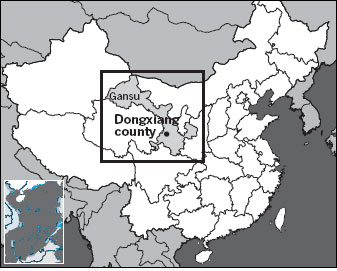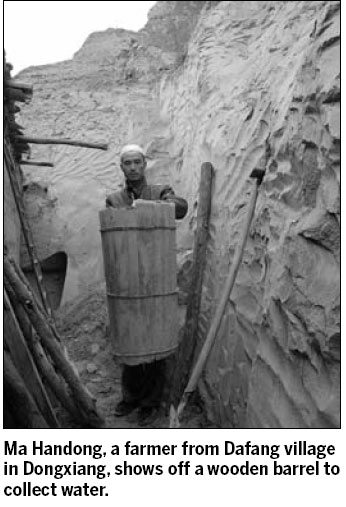Water to the rescue in Dongxiang


Dongxiang county in Northwest China's Gansu province is surrounded by water - but for 28-year-old Ma Qiang, severe drought has been a problem since early childhood.
Today, his job is to do something about the lack of water and improve conditions in the area.
Dongxiang county has access to four rivers but because of its elevation, 740 meters above the water sources, water needs to be pumped up to the villages.
"As long as we have enough water and good roads, the village will get rich quick," says Yang Zengxuan, the chief of Beiling village. Average annual income in the village is currently about 1,300 yuan ($206).
Instead of drawing water from the rivers, most people here get water for their daily use from mountain springs and the households have a donkey to carry the water in wooden barrels over the bumpy, muddy roads.
Ma Handong, 40, from Dafang village, has two donkeys and two sheep in his backyard. His house is built from earth and outside are two cisterns that collect water when it rains.
One of the cisterns was sponsored by the "Mother Cellar" project, initiated by All-China Women's Federation. It mainly helps those living in drought-affected regions to use rain water by building cellars in their yards.
The project was so-named because, in most rural areas, young males leave the village to work as migrant workers and the women stay at home to take care of the family.
As for the project itself, water is collected when it falls onto the roof of the house and a tube runs the water off into the cistern.
The water is used for essential purposes like drinking and washing. Ma has never used a flush toilet and instead uses a big hole over which people squat, in a cave.
Most villagers in Dongxiang grow potato and corn and there is a saying in Gansu that potatoes from Dongxiang are the best in the country. Yet the harvest depends heavily on rainfall.
"This year was severely dry," Ma says. "We hardly had any harvest from our 0.66 hectare plot."
He was looking forward to the corn harvest in mid-October, but again expectations were not high because of the lack of rain.
The good news for Ma and 90,000 people like him is that a project for drinking water initiated by the Ministry of Water Resources is under construction. It is called the Middle-West Water Project of Dongxiang. It is scheduled to be completed by the end of 2013.
Similar projects in Dongxiang have been conducted in recent years, including the Nanyang Irrigation Canal, one of the largest projects so far. These projects have, to some extent, helped Dongxiang people get water for drinking and irrigation.
Ma Zhanhu is 60 years old and his family also grows corn and potatoes. For more than 20 years, the family had to carry water from the nearby Baxie Stream to irrigate crops.
But the river frequently runs dry. Before the canal project went on stream in 2005 he used to harvest just 300 kg of corn, now the figure has doubled.
Even so, Ma Zhanhu says he and his fellow farmers are facing irrigation problems.
"Potatoes are best grown on mountains," Ma says. "At the moment, water from the Nanyang River cannot reach up here."
"As the county is above its surrounding rivers, we are frequently cut off from water supply," says Ma Qiang, who is assisting the project.
The highest building in Dongxiang, up to six stories high, has reduced water flows at peak times because of this.
"This is another aspect that the Middle-West Water Project of Dongxiang is helping," Ma Qiang says. "When the project is completed, four levels of water pumps will lift the water up to the villages, thereby providing enough water and water pressure to supply constant water."














